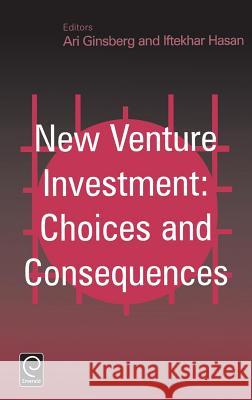New Venture Investment: Choices and Consequences » książka
New Venture Investment: Choices and Consequences
ISBN-13: 9780444512390 / Angielski / Twarda / 2003 / 324 str.
New venture founders and their sponsors seek to create economic value by finding and commercializing new and better ways of doing things. Their common goal, which also defines the purpose of the entrepreneurial process itself, requires a better grasp of the key elements that influence the choices involved in attempting to create economic value under highly uncertain conditions. It also requires a deeper understanding of the consequences of new venture investment as well as the various contextual factors that influence investment decisions and venture outcomes. When confronted with a particular decision making problem faced by entrepreneurs and new venture investors, academic scholars analyze how and why the problem in question is a special case of some theory or model which they know. In seeking to detect generalities and to make abstracted sense of observed realities, academics generally classify the problem in a way that is a natural consequence of the specific discipline- or field-based knowledge they possess (Davidsson, 2002). The explanations that academic researchers provide and the predictions they make are therefore likely to be framed in terms of the types of variables, theoretical perspectives, levels of analysis, and research methodologies with which they are familiar. In seeking to explore the intellectual underpinnings of new venture investment, we have gathered and organized a set of papers that provide scholarly analysis of the choices involved in new venture investment as well as the various contextual factors that influence investment outcomes. To insure a more robust and hopefully interesting scholarly treatment of such problems, we sought to include a variety of interdisciplinary and international perspectives that reflect a broad range of theoretical and empirical approaches.











